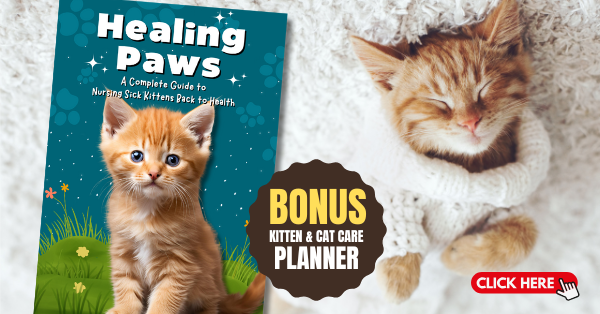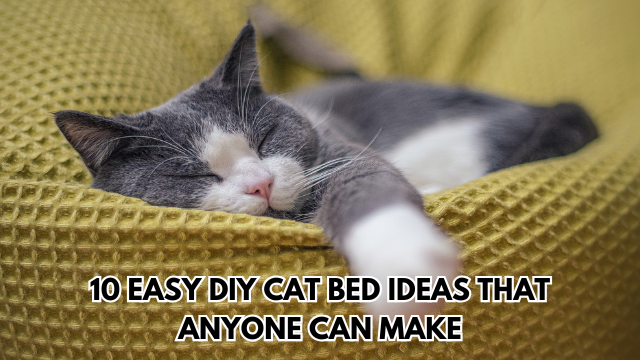“Why does my kitten eat like it hasn’t seen food in days?” If this question has crossed your mind, you’re not alone. Many kitten owners are baffled by their little furball’s seemingly insatiable appetite. Why Is My Kitten Always Hungry ?
- Need More Fuel
- High Energy Levels
- Are You Feeding the Right Food?
- Growth Spurt
- Hunger or Habit?
- Medical Conditions
- Emotional Eating
- Practical Tips for Managing Your Kitten’s Hunger
- Bonus Tip
Why Is My Kitten Always Hungry?
It can feel like your kitten is always asking for food or prowling around the food bowl. Is it normal, or should you be concerned?
Let’s look into the reasons why kittens often act like bottomless pits, and how to make sure their eating habits are healthy and balanced.
Growing Bodies Need More Fuel
Kittens grow at an incredible pace during their first few months. By six months, most kittens are close to their adult size. This rapid growth requires a lot of energy, which they get from their food.
According to The Humane Society, kittens need two to three times more calories than adult cats during their growth phase.
So, if your kitten seems like they’re always hungry, it’s likely because their body is working overtime to grow strong and healthy.
During this time, your kitten may eat multiple small meals throughout the day. This is completely normal and a good way to keep their energy levels consistent.
Think of it as feeding a toddler—frequent snacks help keep their little engines running.

High Energy Levels = High Food Needs
Kittens aren’t just eating machines; they’re also play machines.
If you’ve ever watched your kitten sprint across the room, leap onto furniture, or pounce on imaginary prey, you know they burn a lot of energy.
Play is essential for their physical and mental development, but it also means they’ll need to replenish their energy often.
According to The Spruce Pets, kittens who are highly active will naturally have bigger appetites. It’s their way of fueling all those zoomies! Just ensure they’re eating high-quality kitten food designed to meet their nutritional needs.
Are You Feeding the Right Food?
Not all kitten foods are created equal. Some might not provide enough nutrition or calories to keep up with your kitten’s needs, leaving them hungry even after a meal.
PetMD recommends choosing a high-quality kitten food with the right balance of protein, fat, and essential nutrients. Protein is especially important because it supports muscle growth and energy.
Also, check the feeding guidelines on the packaging. Overfeeding can lead to obesity, while underfeeding can leave your kitten malnourished and constantly hungry. Measuring their portions carefully is key.
Could It Be a Growth Spurt?
Kittens don’t grow at a steady pace—they go through growth spurts where they’ll need more food than usual.
These spurts often happen at around 8–12 weeks and again between 16–20 weeks. During these times, it’s normal for your kitten to seem hungrier than usual.
According to VCA Animal Hospitals, growth spurts are temporary phases where your kitten may require extra calories to support their rapid development. Keep an eye on their weight and adjust their food portions accordingly, but don’t worry—it’s just a phase.
Is It Hunger or Habit?
Sometimes, kittens develop habits that make them seem hungrier than they really are.
For example, if you give them treats every time they meow, they might learn to associate meowing with getting food.
Over time, this can make it seem like they’re always hungry when, in reality, they’re just looking for attention or a tasty snack.
Based on advice from The Humane Society, it’s important to stick to a feeding schedule and avoid rewarding excessive begging. This helps your kitten understand when it’s actually mealtime and prevents overeating.
Medical Conditions That May Cause Hunger
If your kitten’s constant hunger seems extreme or is accompanied by other symptoms like weight loss or diarrhea, it might be a sign of an underlying health issue. Conditions like intestinal parasites, diabetes, or hyperthyroidism can cause an increase in appetite.
According to PetMD, intestinal worms are a common issue in kittens and can make them feel hungry all the time because the parasites are stealing nutrients from their food.
Regular vet checkups and deworming treatments can prevent this. If you’re concerned, don’t hesitate to consult your veterinarian.
Emotional Eating in Kittens?
Yes, even kittens can eat for emotional reasons. If your kitten is stressed, bored, or anxious, they might turn to food for comfort.
This is more common in cats than you might think. Big changes, like moving to a new home or introducing a new pet, can trigger stress-eating behaviors.
According to The Spruce Pets, providing mental stimulation and a stable environment can help reduce emotional eating. Puzzle feeders and interactive toys are great ways to keep your kitten entertained without relying on food.

Practical Tips for Managing Your Kitten’s Hunger
Now that you know why your kitten might always seem hungry, here are some practical tips to ensure they’re eating the right amount:
- Stick to a Schedule: Feed your kitten at the same times every day. This helps them understand when to expect food and reduces begging behavior.
- Choose Quality Food: Invest in high-quality kitten food that meets all their nutritional needs. Look for brands recommended by your vet or trusted sources like The American Association of Feline Practitioners.
- Monitor Portion Sizes: Use a measuring cup to ensure you’re feeding the correct amount based on their age and weight.
- Provide Fresh Water: Always make sure your kitten has access to clean, fresh water. Sometimes, what seems like hunger is actually thirst.
- Use Puzzle Feeders: These slow down eating and provide mental stimulation, making mealtimes more engaging.
- Regular Vet Visits: Keep up with vet checkups to rule out any health issues that could be causing excessive hunger.
Bonus Tip: Keep Treats Special
While it’s tempting to reward your kitten with treats, try to keep them as an occasional indulgence.
Overusing treats can throw off their balanced diet and encourage begging.
Instead, use playtime or cuddles as rewards—they’re just as satisfying for your kitten!
Read: How to Tell If a Kitten Will Be a Good Cat ?
Kittens are little bundles of energy and curiosity, which often translates to big appetites. In most cases, their constant hunger is a natural part of their growth and development.
By feeding them the right food, sticking to a routine, and keeping an eye on their health, you can ensure they’re getting everything they need without overfeeding.
Remember, a hungry kitten isn’t always a bad thing—it’s a sign they’re growing and thriving.
With a little attention and care, you can keep your kitten happy, healthy, and full of energy for all those playful adventures ahead!***
Watch Videos about Cat & Kitten Care on Youtube @naowthecat